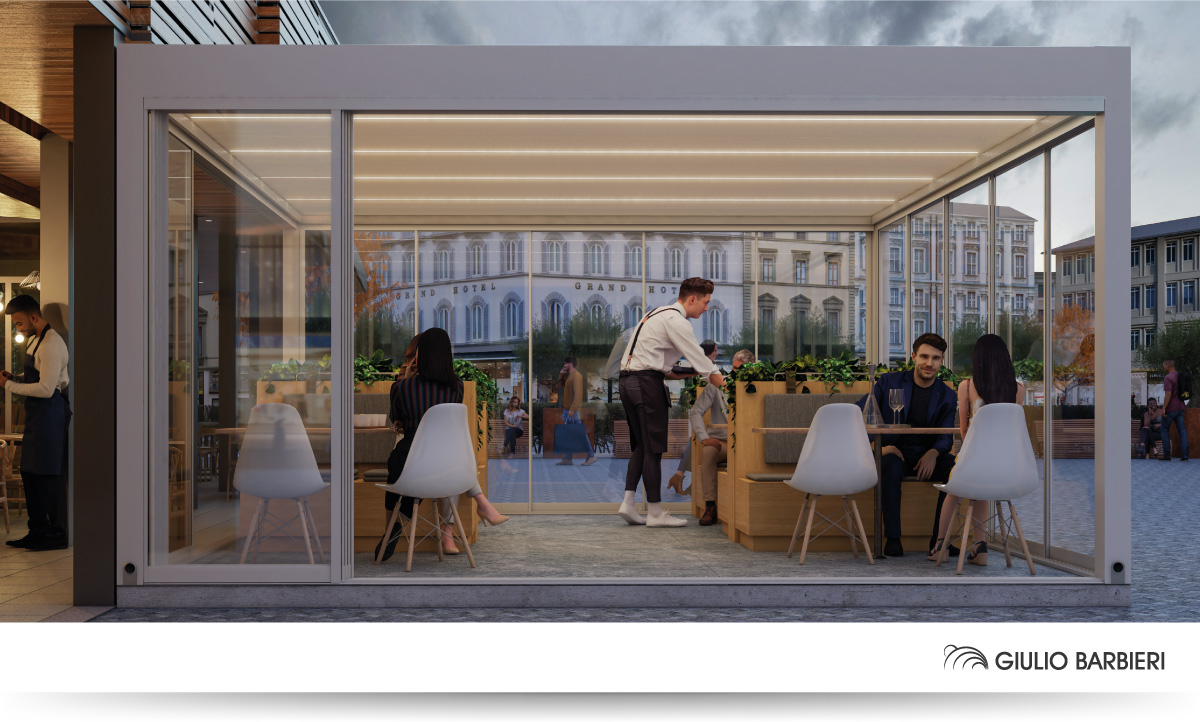Acoustic comfort in hotels and restaurants: the well-being of customers depends on reverberation time.
Today, more than ever, it is important for the hospitality sector to rethink its own spaces and offer added value that can be combined with catering and service, to provide areas where customers can be received in a cozy, welcoming, embracing environment.
Have you ever wondered, for example, what factors determine public appreciation of your enterprise? We imagine that this is a recurring question that many restaurant entrepreneurs ask themselves. The answers are generally attributable to a few fundamental and commonly recurring concepts. Apart from the quality of the food on offer, another major consideration for restaurant goers is location. More than ever, customers value the experience they have in your business, remembering past sensations of well-being and relaxation. Thus, going out for a meal is more of a complex journey, experienced and shared collectively. Auditory memory is what allows us to recall sensory sensations associated with a specific place. If remembering your restaurant recalls auditory memories of chaos, confusion, and loud noise, it could affect customer feedback, making the management of noise levels very important.
Today, guaranteeing optimal acoustic comfort is essential.
Thus, a well-designed outdoor space is extremely valuable in that it increases the number of spaces available for the restaurateur to seat guests, but even more importantly allows him to offer a satisfying experience that helps to please and retain customers.
As such, if you are planning to expand or redesign your space, one of the things that deserves serious consideration is finding solutions that provide acoustic comfort and privacy for your customers.
Acoustic comfort and reverberation time
Acoustic comfort describes an environment's ability to ensure a comfortable stay on the premises for everyone, ensuring that guests are not disturbed by the voices of others, and that the staff is attentive and energetic, even after several hours of work.
Excessive sound levels caused by reverberation can create a situation of continuous pressure. Our brains are constantly stimulated by trying to distinguish the voice the person we are conversing with the from background noise and other voices present in the room. This distraction by unwanted sounds is tiring, making conversation difficult and staff less productive.
It is therefore important to take the necessary precautions to ensure acoustic comfort in your restaurant and, above all, to rearrange the environment so that everyone feels comfortable. It is therefore very important that the arrangement you settle on has a low "reverberation time"; that is, the time it takes for a sound generated in the room to become inaudible should be as short as possible.
What does the reverberation time depend on? Several aspects; notably, the size of the room, and the capacity of the surfaces and elements therein (walls, ceiling, curtains, furniture, etc.) to reflect or absorb sound waves. The acoustic panels in mineral wool is a good solution to reduce reverberation time, like that used in Eclettica, Giulio Barbieri’s bioclimatic pergola.
Eclettica, our solution to eliminate acoustic reverberation
Taking into account the needs of the hospitality sector, at Giulio Barbieri we have designed Eclettica, a bioclimatic pergola whose roof is made of sound-absorbing, rock-mineral wool panels, which considerably reduce acoustic reverberation, absorb sound waves, and create an acoustically secure environment.
More precisely, Eclettica is composed of:
• Canvas: made of a class-1 fire-resistant membrane and PVC-coated polyester. The manufacturer is Ferrari, a leading company in the production of fabrics used for the construction of flexible structures that are perfect for building functional garden furniture.
• Absorbent mass: composed of rock-mineral wool sandwich panels and polyurethane foam, the surface of the roof is 100% paneled, ensuring invisibility and guaranteeing a minimalist design with attention to the smallest detail.
We remind you that the protection of living spaces from external noise or nearby environments is becoming increasingly important, both because of rising demands for certification at the regulatory level (DPCM 5/12/97), as evidenced by current law (Law 447/1995), and also because of the public’s increasing sensitivity to the problem of noise pollution.

